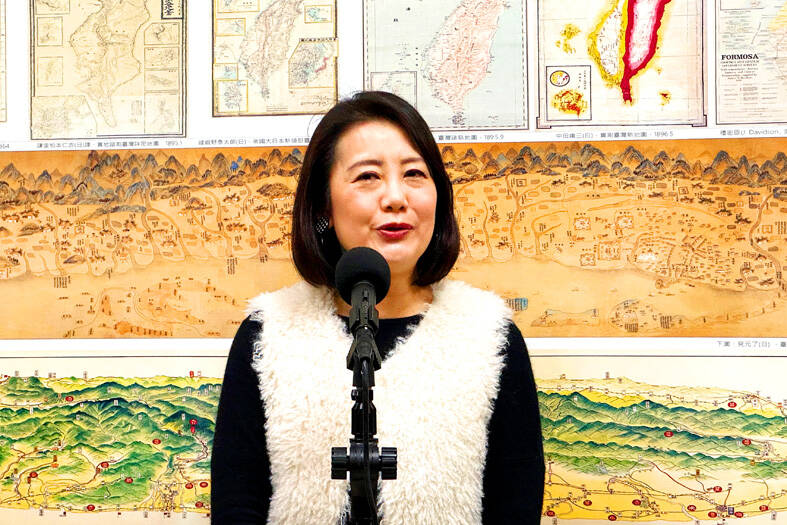A proposal to make presidential elections a “two-round system” was widely criticized yesterday, with lawmakers saying that it was unconstitutional, would subvert Taiwan’s political system and is a delusional idea that would waste resources.
Chinese Nationalist Party (KMT) Legislator Weng Hsiao-ling (翁曉玲) earlier this week proposed amendments to the Presidential and Vice Presidential Election and Recall Act (總統副總統選舉罷免法) that would require candidates to win a majority of votes and if no one garners more than 50 percent, a second-round election between the two top tickets should be held.
Article 63 of the act would be changed from the group of candidates who “get the most votes shall be elected” to “get a majority of votes shall be elected,” said Weng, who is a professor of law.

Photo: Chen Cheng-yu, Taipei Times
Taiwan should learn from France and Austria, which have two-round systems, she said.
However, lawmakers — including some from Weng’s own party — criticized the idea.
KMT Legislator Lai Shyh-bao (賴士葆) said that the proposal calls for a second-round vote — if required — two weeks after the first round, which “would require a lot of resources and come at a high cost to society.”
Democratic Progressive Party (DPP) Legislator Rosalia Wu (吳思瑤) said that the proposed changes would contravene the Constitution.
Weng’s proposal is a delusional and absurd idea, and exposes her ignorance of the law, Wu said.
Weng should read Article 2 of the Additional Articles of the Constitution (憲法增修條文), which states that “the presidential and the vice presidential candidates” must register jointly on the ballot, with “the pair that receives the highest number of votes” being elected, Wu said.
“To change the electoral system would require considerable discussion in society, as well as an extensive study on how it would affect expenses and resources,” she said.
It appears that KMT members believe a two-round system would benefit their party, she added.
DPP Legislator Michelle Lin (林楚茵) also said that the proposal ignores the Constitution.
“No matter what her aims are, Weng should not undermine the Constitution and subvert our political system,” Lin said.
Lin said that Weng has a political agenda, as her husband is Chen Chun-sheng (陳春生), a judge appointed by former president Ma Ying-jeou (馬英九) of the KMT.
“Weng is supposedly an expert in constitutional law, but it appears that she is trying to circumvent the Constitution, as she knows that the KMT would not be able to reach the threshold to amend it according to the rules — even with the support of the Taiwan People’s Party,” Lin said. “Maybe she is just seeking the media spotlight and attention on social media.”
In January’s presidential election, there were 19.54 million eligible voters, with 14.04 million casting ballots, Weng wrote in her motion seeking the amendment.
“For a ticket to win in the first round, it must obtain more than half of the ballots cast, or about 7.02 million votes,” she wrote.
“The DPP’s presidential ticket of Vice President William Lai (賴清德) and former representative to the US Hsiao Bi-khim (蕭美琴) garnered 5.58 million votes, or 40.05 percent,” she wrote.
The DPP’s ticket did not win a majority and it did not win a majority in the legislature, creating a “rule by minority,” she added.
Additional reporting by Chen Cheng-yu and CNA

Alain Robert, known as the "French Spider-Man," praised Alex Honnold as exceptionally well-prepared after the US climber completed a free solo ascent of Taipei 101 yesterday. Robert said Honnold's ascent of the 508m-tall skyscraper in just more than one-and-a-half hours without using safety ropes or equipment was a remarkable achievement. "This is my life," he said in an interview conducted in French, adding that he liked the feeling of being "on the edge of danger." The 63-year-old Frenchman climbed Taipei 101 using ropes in December 2004, taking about four hours to reach the top. On a one-to-10 scale of difficulty, Robert said Taipei 101

A preclearance service to facilitate entry for people traveling to select airports in Japan would be available from Thursday next week to Feb. 25 at Taiwan Taoyuan International Airport, Taoyuan International Airport Corp (TIAC) said on Tuesday. The service was first made available to Taiwanese travelers throughout the winter vacation of 2024 and during the Lunar New Year holiday. In addition to flights to the Japanese cities of Hakodate, Asahikawa, Akita, Sendai, Niigata, Okayama, Takamatsu, Kumamoto and Kagoshima, the service would be available to travelers to Kobe and Oita. The service can be accessed by passengers of 15 flight routes operated by

Taiwanese and US defense groups are collaborating to introduce deployable, semi-autonomous manufacturing systems for drones and components in a boost to the nation’s supply chain resilience. Taiwan’s G-Tech Optroelectronics Corp subsidiary GTOC and the US’ Aerkomm Inc on Friday announced an agreement with fellow US-based Firestorm Lab to adopt the latter’s xCell, a technology featuring 3D printers fitted in 6.1m container units. The systems enable aerial platforms and parts to be produced in high volumes from dispersed nodes capable of rapid redeployment, to minimize the risk of enemy strikes and to meet field requirements, they said. Firestorm chief technology officer Ian Muceus said

MORE FALL: An investigation into one of Xi’s key cronies, part of a broader ‘anti-corruption’ drive, indicates that he might have a deep distrust in the military, an expert said China’s latest military purge underscores systemic risks in its shift from collective leadership to sole rule under Chinese President Xi Jinping (習近平), and could disrupt its chain of command and military capabilities, a national security official said yesterday. If decisionmaking within the Chinese Communist Party has become “irrational” under one-man rule, the Taiwan Strait and the regional situation must be approached with extreme caution, given unforeseen risks, they added. The anonymous official made the remarks as China’s Central Military Commission Vice Chairman Zhang Youxia (張又俠) and Joint Staff Department Chief of Staff Liu Zhenli (劉振立) were reportedly being investigated for suspected “serious